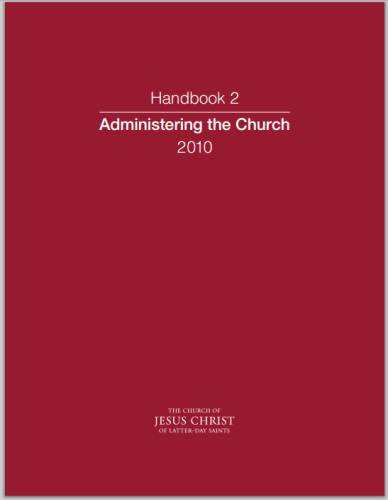[Cross Posted from Sixteen Small Stones]

This is the third entry in a series of blog posts about some of the interesting and important policies of the Church of Jesus Christ of Latter-day Saints contained in the church’s official Handbook #2. Familiarity and compliance with LDS Church guidelines is important. For background, see the introductory post.
Reasons Why Some People Have Disabilities
“Leaders and members should not attempt to explain why the challenge of a disability has come to a family. They should never suggest that a disability is a punishment from God (see John 9:2–3). Nor should they suggest that it is a blessing to have a child who has a disability.” (emphasis added)
Handbook 2: 21.1.26



As the father of three kids with Autism this goes through my mind often. Luckily I was an atheist for 32 years before joining the church, so I am used to not needing a reason for things. Inevitably, trying to explain these things does nothing to help deal with them in the here and now and can lead people to deny, delay, or dissemble. Supporting those in need is the requirement, not understand why they are in need.
Interesting.
I did not know there was a prohibition against calling it a blessing. I wonder what would happen if every fast-Sunday the bishopric would remind the congregation of this fact.
You’re misreading the instruction, h_nu. If you believe that your child’s disability is a blessing to you, feel free to say so. But don’t you, either as a church leader or as a “loving” fellow member, presume to tell someone else that his child’s disability is a blessing.
If someone were to tell me that, I’d be inclined to tell him a moment later that his broken nose was a blessing too.
“Who sinned, this man or his parents, that he was born blind?” Jesus says, “Neither, but that the works of God might be made manifest in him.” What did Jesus mean? Did he mean that blindess is a gift of God, divine works made manifest in someone? Or did he mean that he was made blind because he was destined to be healed by the Savior, and this healing would be the “works of God manifest in him?”
We can say this: that someone with a disability provides the opportunity to serve, and this opportunity is a potential blessing, as any opportunity to serve would be.
I think what the Handbook is warning against, is the attitude of karma that we sometimes have in the church, that everything happens for a reason. But is this true? Do some things happen purely because of blind chance, pure fate? Which is more horrible? To believe in a God who meticulously plans all sorts of horrible events, specially designed as necessary trials for his children, or a God who sets the universe spinning and leaves it to it’s own devices, knowing that whatever craziness happens, it can work to people’s good if they turn to Him for help?
Handicaps, death, illness etc… are part of life’s journey and G-d’s Plan of Happiness. All mortal experiences (easy, difficult, good, bad etc..) are under the big umbrella of “works of G-d”. Neither individual trials or good fortunes are caused by G-d, but all are part of this “blessing” called life.
Like Craig said, it is counter-productive and often offensive, to attribute punishment or blessings for handicaps. After all, we are not G-d and cannot know his will. It is not appropriate for us to speak for Him regarding the lives of others. However, we all have the responsibility to render Christ-like service ( not judgement or blame) to those of our brothers and sisters in need, no matter their circumstances.
Oh everything happens for a reason, I just doubt whether God was the reason.
For instance. I get a cold because I get a bug. Maybe my immune system is compromised because I haven’t been getting enough sleep, because I’m stressed, etc.
True, everything happens for a reason, h_nu. But does a disability happen because God masterminded and tailored that particular trial for that person and family? Or does it happen because a faulty sperm happened to be first in line to get the egg, and God did nothing more than create a world where a certain percentage of sperms would be faulty? I think some people get comfort from the idea that God tailored their trial specifically for them, and some people get comfort believing that this is a fallen world and God picks up the pieces and is able to turn bad into good. Perhaps the Handbook is saying we don’t know one way or the other, and we shouldn’t presume to interpret God’s designs according to our preference for one or the other point of view.
I think part of the issue is that there have been many speculative theories bantered about that are useless and likely completely false. For example, “This spirit was SO GOOD in the pre-mortal life that God made them mentally handicapped (and thus guaranteed salvation) because they don’t need the tests the rest of us are given). Aren’t you SO BLESSED to be a parent to such a spirit?”
I’ve heard this before, from leaders even. These sorts of things are entirely speculative and completely ridiculous. They make no logical sense, and they cement folklore interpretations of church doctrine. And people feel warm and fuzzy for thinking about it that way. And it gives no solace to the actual parents who are raising their child, because they see their child hurt, and that’s no gift.
I do think, however, that we are free to say, “The opportunity to serve and grow as a parent and as a person because of this experience is a blessing in disguise.” The handbook simply discourages priesthood leaders from making such statements or pronouncements.